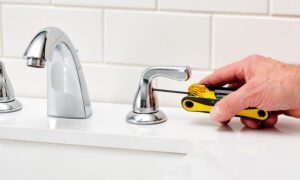Introduction:
A malfunctioning air conditioning (AC) unit can be a significant inconvenience, especially during the scorching summer months. When faced with a broken AC, homeowners often find themselves grappling with the decision of whether to repair or replace it. This article aims to guide you through this dilemma, providing insights and considerations to help you make an informed decision.
Assessing the Situation:
The first step in dealing with a broken AC is to assess the extent of the problem. Is it a minor issue that can be easily fixed, or does it require extensive repairs? Calling in a professional HVAC technician to diagnose the problem is crucial at this stage. They can identify the underlying issues and provide you with an estimate for the repairs.
Cost-Benefit Analysis:
Once you have an idea of the repair costs, it’s essential to weigh them against the benefits. Consider the age of your AC unit and its overall condition. If the repairs are relatively minor and your AC is still relatively new, repairing it may be the most cost-effective option. However, if your unit is old and has a history of frequent breakdowns, investing in repairs might only be a temporary solution.
Energy Efficiency:
Older AC units tend to be less energy-efficient compared to newer models. If your unit is nearing the end of its lifespan, repairing it may not be the most economical choice in the long run. Newer AC models are designed to be more energy-efficient, which can result in lower utility bills over time. Additionally, some governments offer incentives for upgrading to energy-efficient appliances, further offsetting the cost of a new AC unit.
Environmental Impact:
Another factor to consider is the environmental impact of repairing versus replacing your AC unit. Older models may use refrigerants that are harmful to the environment, such as R-22. Upgrading to a newer, eco-friendly model can help reduce your carbon footprint and contribute to sustainability efforts. Additionally, newer AC units are often designed with more efficient cooling systems, further reducing their environmental impact.
Comfort and Convenience:
Living without air conditioning, especially in areas with hot and humid climates, can be incredibly uncomfortable. If your AC breaks down during the peak of summer, repairing it may be the quickest way to restore comfort to your home. However, if the repairs are extensive and will take several days to complete, you may need to explore alternative cooling options in the meantime.
Long-Term Maintenance:
Regular maintenance is key to prolonging the lifespan of your AC unit and preventing future breakdowns. If you decide to repair your AC, make sure to schedule routine maintenance appointments with a qualified technician. This will help identify any potential issues early on and keep your unit running smoothly for years to come.
Future Plans:
Consider your future plans before making a decision about repairing or replacing your AC unit. If you plan to sell your home in the near future, investing in a new, energy-efficient AC unit can increase its value and appeal to potential buyers. On the other hand, if you’re planning to stay in your home for the long term, a new AC unit can provide you with peace of mind and long-term savings on energy costs.
Conclusion:
Deciding whether to repair or replace a broken AC unit requires careful consideration of various factors, including repair costs, energy efficiency, environmental impact, and long-term maintenance. Ultimately, the right decision depends on your circumstances and priorities. Consulting with a professional HVAC technician can help you weigh your options and make an informed choice that meets your needs and budget. Whether you choose to repair your existing unit or invest in a new one, ensuring that your home remains cool and comfortable should be the ultimate goal.































